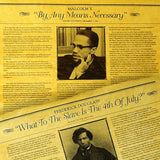


Malcolm X and Frederick Douglass Speech Transcripts
- Set of 2
- 14 X 16 inches
- Unframed
- Parchment paper, unique in appearance, with crinkles and aging process characteristics. Please note that the parchment may darken over time. We recommend framing behind UV protective coated glass to avoid this discoloration
- Made in small batches in Philadelphia, PA
-
The National Archives Store is pleased to offer this set of historically significant speeches by charismatic orators Malcolm X and Frederick Douglass. Printed in their entirety, the speeches, which were delivered almost 90 years apart, both speak to the lack of liberties for black people.
Frederick Douglass’ "What to the Slave is the 4th of July?" was presented in Rochester, New York, on July 5th, 1852. Considered among many to be the greatest anti-slavery speech ever delivered, it reminded listeners that for slaves and former slaves, the Declaration of Independence represented the unfulfilled promise of liberty for all.
In December 1964, Malcolm X took part in a debate at the Oxford University Union Society. He spoke of America as a racist society where the only way to bring about change is to speak the language that the racialists understand. He contended that racialists never understand peaceful, non-violent language and that they had been speaking their type of language to black people for over 400 years.
-
Frederick Douglass, one of the foremost social reformers of the 19th century, was born into slavery in 1817 or 1818. Having gained his freedom as a young man, he devoted his life to the cause of human liberty and equality. In 1889, President Benjamin Harrison appointed Frederick Douglass as Minister-Resident and Consul General to the Republic of Haiti. Douglass readily accepted the position, having long admired the people of Haiti for their fight for and victory in gaining independence. He served as Minister to Haiti until July 30, 1891.
Douglass’s June 1889 letter of acceptance to this appointment is held in the National Archives series Despatches from US Consular Officers (National Archives Identifier 302033).
Born Malcolm Little in Omaha, Nebraska, Malcolm X experienced extreme racism when he was a youngster, spent years in the foster system, and served a sentence in jail for larceny and breaking and entering. While in jail, he joined the Nation of Islam, and after his release became the public face of the organization. He led countless demonstrations and spoke publicly, both nationally and internationally, with a focus on empowering Black people. Records at the National Archives related to Malcolm X include Federal Bureau of Investigation (FBI) case files and recordings of his speeches and debates.